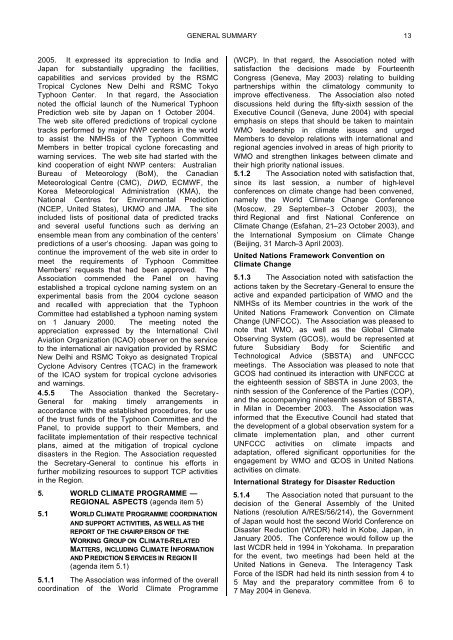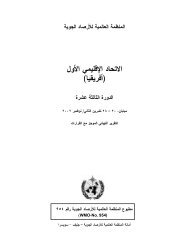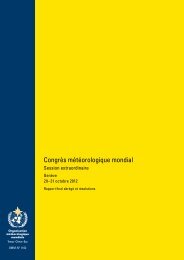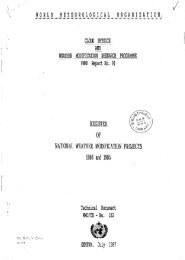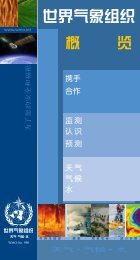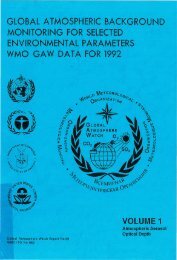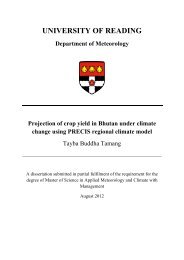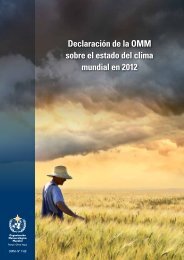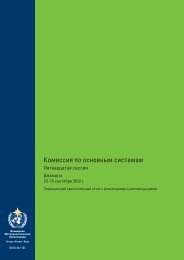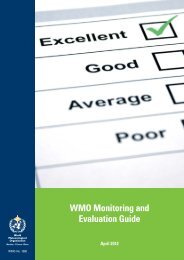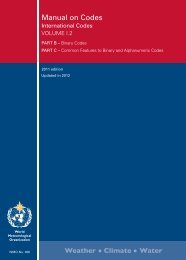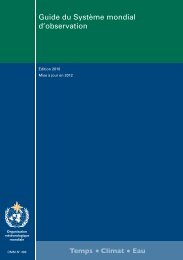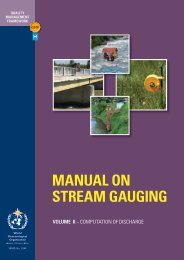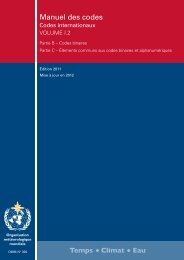Regional Association II (ASIA) - E-Library - WMO
Regional Association II (ASIA) - E-Library - WMO
Regional Association II (ASIA) - E-Library - WMO
Create successful ePaper yourself
Turn your PDF publications into a flip-book with our unique Google optimized e-Paper software.
GENERAL SUMMARY 132005. It expressed its appreciation to India andJapan for substantially upgrading the facilities,capabilities and services provided by the RSMCTropical Cyclones New Delhi and RSMC TokyoTyphoon Center. In that regard, the <strong>Association</strong>noted the official launch of the Numerical TyphoonPrediction web site by Japan on 1 October 2004.The web site offered predictions of tropical cyclonetracks performed by major NWP centers in the worldto assist the NMHSs of the Typhoon CommitteeMembers in better tropical cyclone forecasting andwarning services. The web site had started with thekind cooperation of eight NWP centers: AustralianBureau of Meteorology (BoM), the CanadianMeteorological Centre (CMC), DWD, ECMWF, theKorea Meteorological Administration (KMA), theNational Centres for Environmental Prediction(NCEP, United States), UKMO and JMA. The siteincluded lists of positional data of predicted tracksand several useful functions such as deriving anensemble mean from any combination of the centers’predictions of a user’s choosing. Japan was going tocontinue the improvement of the web site in order tomeet the requirements of Typhoon CommitteeMembers’ requests that had been approved. The<strong>Association</strong> commended the Panel on havingestablished a tropical cyclone naming system on anexperimental basis from the 2004 cyclone seasonand recalled with appreciation that the TyphoonCommittee had established a typhoon naming systemon 1 January 2000. The meeting noted theappreciation expressed by the International CivilAviation Organization (ICAO) observer on the serviceto the international air navigation provided by RSMCNew Delhi and RSMC Tokyo as designated TropicalCyclone Advisory Centres (TCAC) in the frameworkof the ICAO system for tropical cyclone advisoriesand warnings.4.5.5 The <strong>Association</strong> thanked the Secretary-General for making timely arrangements inaccordance with the established procedures, for useof the trust funds of the Typhoon Committee and thePanel, to provide support to their Members, andfacilitate implementation of their respective technicalplans, aimed at the mitigation of tropical cyclonedisasters in the Region. The <strong>Association</strong> requestedthe Secretary-General to continue his efforts infurther mobilizing resources to support TCP activitiesin the Region.5. WORLD CLIMATE PROGRAMME —REGIONAL ASPECTS (agenda item 5)5.1 WORLD CLIMATE PROGRAMME COORDINATIONAND SUPPORT ACTIVITIES, AS WELL AS THEREPORT OF THE CHAIRP ERSON OF THEWORKING GROUP ON CLIMATE-RELATEDMATTERS, INCLUDING CLIMATE INFORMATIONAND PREDICTION SERVICES IN REGION <strong>II</strong>(agenda item 5.1)5.1.1 The <strong>Association</strong> was informed of the overallcoordination of the World Climate Programme(WCP). In that regard, the <strong>Association</strong> noted withsatisfaction the decisions made by FourteenthCongress (Geneva, May 2003) relating to buildingpartnerships within the climatology community toimprove effectiveness. The <strong>Association</strong> also noteddiscussions held during the fifty-sixth session of theExecutive Council (Geneva, June 2004) with specialemphasis on steps that should be taken to maintain<strong>WMO</strong> leadership in climate issues and urgedMembers to develop relations with international andregional agencies involved in areas of high priority to<strong>WMO</strong> and strengthen linkages between climate andtheir high priority national issues.5.1.2 The <strong>Association</strong> noted with satisfaction that,since its last session, a number of high-levelconferences on climate change had been convened,namely the World Climate Change Conference(Moscow, 29 September–3 October 2003), thethird <strong>Regional</strong> and first National Conference onClimate Change (Esfahan, 21–23 October 2003), andthe International Symposium on Climate Change(Beijing, 31 March–3 April 2003).United Nations Framework Convention onClimate Change5.1.3 The <strong>Association</strong> noted with satisfaction theactions taken by the Secretary -General to ensure theactive and expanded participation of <strong>WMO</strong> and theNMHSs of its Member countries in the work of theUnited Nations Framework Convention on ClimateChange (UNFCCC). The <strong>Association</strong> was pleased tonote that <strong>WMO</strong>, as well as the Global ClimateObserving System (GCOS), would be represented atfuture Subsidiary Body for Scientific andTechnological Advice (SBSTA) and UNFCCCmeetings. The <strong>Association</strong> was pleased to note thatGCOS had continued its interaction with UNFCCC atthe eighteenth session of SBSTA in June 2003, theninth session of the Conference of the Parties (COP),and the accompanying nineteenth session of SBSTA,in Milan in December 2003. The <strong>Association</strong> wasinformed that the Executive Council had stated thatthe development of a global observation system for aclimate implementation plan, and other currentUNFCCC activities on climate impacts andadaptation, offered significant opportunities for theengagement by <strong>WMO</strong> and GCOS in United Nationsactivities on climate.International Strategy for Disaster Reduction5.1.4 The <strong>Association</strong> noted that pursuant to thedecision of the General Assembly of the UnitedNations (resolution A/RES/56/214), the Governmentof Japan would host the second World Conference onDisaster Reduction (WCDR) held in Kobe, Japan, inJanuary 2005. The Conference would follow up thelast WCDR held in 1994 in Yokohama. In preparationfor the event, two meetings had been held at theUnited Nations in Geneva. The Interagency TaskForce of the ISDR had held its ninth session from 4 to5 May and the preparatory committee from 6 to7 May 2004 in Geneva.


